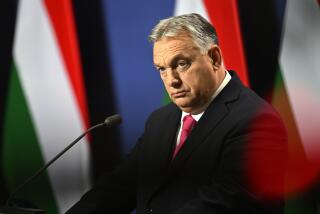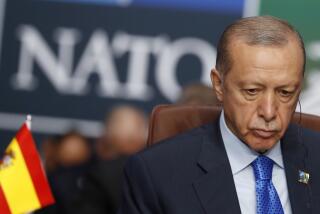Security Council Delays Vote on Serb Sanctions
- Share via
WASHINGTON — The United States and the rest of the Security Council bowed to Russian pressure Monday and postponed the vote on tougher sanctions against Serbia until after an April 25 referendum that may determine the future of Russian President Boris N. Yeltsin.
The Russians, however, did not cite Yeltsin’s domestic troubles as the official reason for their plea for a delay. Instead, according to Secretary of State Warren Christopher, they insisted that they need to be given more time to cajole the Serbs into accepting a plan to end the civil war in Bosnia-Herzegovina.
“The Russians are working very intensively to try to persuade the Bosnian Serbs to negotiate,” Christopher told reporters accompanying him on a flight to Tokyo. “It seemed to us to be prudent to honor the request that came from the Russians to have a two-week delay in the vote.”
In New York, Deputy Russian Foreign Minister Vitaly Churkin told reporters, “Now is the time for more talk, not new sanctions.”
The Security Council evidently had little choice but to give in to the Russians. According to French Foreign Minister Alain Juppe, they threatened a veto if their demand for a delay was rejected.
“We’ve acted on the fact that our partners, principally the Russians, didn’t want a vote today,” Juppe told French television, “and, to tell it like it is, the Russians even evoked the possibility of using their right to veto.”
Putting the best light on the delay, U.S. officials said they had won a promise from the Russians that, after the sanctions are approved, they would go into effect immediately. The present resolution before the Security Council would have delayed implementation for two weeks to give the Serbs time, while under pressure of the resolution, to end their military offensive.
As a result, Christopher told reporters that “the two-week delay (in voting on the resolution) is not likely to result in any delay in actual enforcement.” But it does mean that the Bosnian Serbs, who seem intent on overrunning the last Muslim enclaves in eastern Bosnia, do not have the psychological pressure of an approved U.N. resolution over them.
Members of the Security Council had left for their Easter weekend believing that the Russians, who had tried in vain to delay the resolution and weaken it with many amendments last Thursday, would now accept the resolution, albeit grudgingly, and allow it to come to a vote Monday.
But Russian Foreign Minister Andrei V. Kozyrev spoke with Christopher by phone both Friday and early Monday and pressed the Russian demand for a two-week delay.
Yeltsin, campaigning hard for a referendum that amounts to a vote of confidence in him, faces fervid attacks from hard-line nationalists who accuse him of abandoning Serbia, a traditional Slavic and Orthodox Christian ally of Russia. They insist he should try to lift the sanctions on Serbia, not try to strengthen them.
In Washington, State Department spokesman Richard Boucher implied that the Russians had promised to vote for the sanctions once the resolution comes to a vote April 26.
“We’re proceeding on the understanding that they will cooperate in the adoption of the resolution to tighten sanctions if the Bosnian Serbs have not come into agreement on the Vance-Owen peace process and ceased their military actions by then,” Boucher said.
The peace plan worked out by former Secretary of State Cyrus R. Vance and former British Foreign Secretary Lord Owen has been accepted by the Bosnian Croats and the Bosnian Muslims but not the Bosnian Serbs. The Serbs, under the plan, would have to move out of some areas that they have conquered during the last year of civil war.
Boucher said Radovan Karadzic, the Bosnian Serb leader, has offered to resume negotiations with Vance and Owen in Geneva and is likely to meet with them sometime during the next two weeks. His followers, however, convening as a self-styled parliament, proclaimed their rejection of the Vance-Owen plan last week.
The Security Council resolution is aimed at the Serbian government on the assumption that it has the means to call off Serbian aggression in Bosnia. Serbia and its ally Montenegro, the last remaining republics of the old Yugoslavia, are already the target of U.N. sanctions, but the resolution would strengthen them considerably.
Under the new provisions, the United Nations would prohibit all but humanitarian supplies from entering and crossing Yugoslavia by truck and rail; ban all Yugoslav ships from the Danube River and the Adriatic Sea; monitor all other ships and subject them and all cars, planes and railroad cars to confiscation if they break sanctions; set up a 12-mile, NATO-enforced zone in the Adriatic that is off-limits to all shipping except for emergencies, and freeze all Yugoslav financial funds abroad.
Times staff writers Doyle McManus, traveling with Secretary of State Christopher, and Norman Kempster and John M. Broder, in Washington, also contributed to this report.
More to Read
Sign up for Essential California
The most important California stories and recommendations in your inbox every morning.
You may occasionally receive promotional content from the Los Angeles Times.













